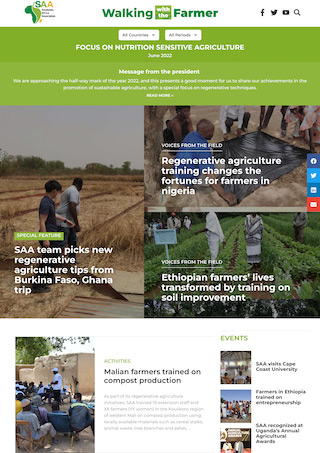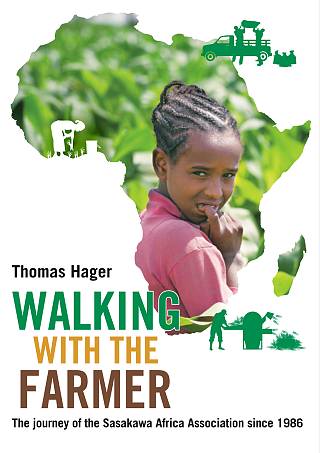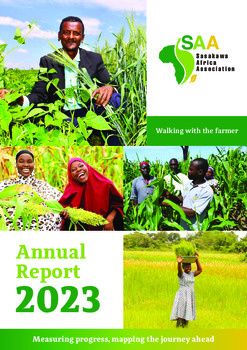【Event Report & Video】TICAD 9 Official Side Event: Transforming African Food Systems through Regenerative Agriculture
 Group photo of speakers (titles omitted): Front row (from left): Dr. Lilian Lihasi (Executive Director, AFAAS), Dr. Ismahane Elouafi (Executive Managing Director, CGIAR), Dr. Amit Roy (Chair, Sasakawa Africa Association), Shinjiro Koizumi (Minister of Agriculture, Forestry and Fisheries of Japan), Yohei Sasakawa (Honorary Chair, The Nippon Foundation), Dr. Osamu Koyama (President, JIRCAS), Dr. Aggrey Agumya (Executive Director, FARA) Back row (from left): Ethiopia Tadesse (SAA), Dr. Papa Saliou Sarr (JIRCAS), Elizabeth Nsimadala (President, EAFF), Dr. Mel Oluoch (SAA), Shuichi Suzuki (President, SAA), Dr. David Nielson (NAAAN), Dr. Wole Fatunbi (FARA), Dr. Stella Kabiri (SAA)
Group photo of speakers (titles omitted): Front row (from left): Dr. Lilian Lihasi (Executive Director, AFAAS), Dr. Ismahane Elouafi (Executive Managing Director, CGIAR), Dr. Amit Roy (Chair, Sasakawa Africa Association), Shinjiro Koizumi (Minister of Agriculture, Forestry and Fisheries of Japan), Yohei Sasakawa (Honorary Chair, The Nippon Foundation), Dr. Osamu Koyama (President, JIRCAS), Dr. Aggrey Agumya (Executive Director, FARA) Back row (from left): Ethiopia Tadesse (SAA), Dr. Papa Saliou Sarr (JIRCAS), Elizabeth Nsimadala (President, EAFF), Dr. Mel Oluoch (SAA), Shuichi Suzuki (President, SAA), Dr. David Nielson (NAAAN), Dr. Wole Fatunbi (FARA), Dr. Stella Kabiri (SAA)On August 22, 2025, from 10:00 am to 11:30 am, SAA in collaboration with the Japan International Research Center for Agricultural Sciences (JIRCAS)and the Forum for Agricultural Research in Africa (FARA) held an official side event for TICAD9 "Transforming African Food Systems through Regenerative Agriculture: Strategies, Policies, and Alliances to Empower Youth and Farmers” at Pacifico Yokohama in Yokohama.

Dr. Amit Roy, Chair of the Sasakawa Africa Association (SAA), delivering the opening remarks
In his opening remarks, Dr. Amit Roy, Chair of SAA, emphasized that soil health is the foundation of food security and inclusive growth, that transformation must place youth and women at the center, and that international collaboration linking research, extension, and human capacity development is essential. He also referred to the progress of the Soil Initiative for Africa (SIA), highlighted Japan–Africa collaboration such as TERRA Africa, supported by The Nippon Foundation and implemented by JIRCAS, and further noted regional partnerships such as SAA’s collaboration with the African Forum for Agricultural Advisory Services (AFAAS).
Highlights of the Discussion
This event focused on transforming food systems with an emphasis on soil health and youth employment, building on the momentum from last May's Nairobi Declaration at the Africa Fertilizer and Soil Health Summit and the progress of the Soil Initiative for Africa (SIA). The event began with opening remarks from Japan's Minister of Agriculture, Forestry and Fisheries, Shinjiro Koizumi, followed by a keynote speech from Ismahane Elouafi, Executive Managing Director of the Consultative Group on International Agricultural Research (CGIAR).
 Mr. Koizumi , Minister of Agriculture, Forestry and Fisheries speaking about Japan's contribution to the future of youth and agriculture.
Mr. Koizumi , Minister of Agriculture, Forestry and Fisheries speaking about Japan's contribution to the future of youth and agriculture.1. The Necessity of Science-Based Regenerative Agriculture:
In her keynote address, Dr. Ismahane Elouafi, Executive Managing Director of CGIAR, emphasized that to combat climate change and soil degradation in Africa, it is essential to promote regenerative agriculture (RA) techniques based on scientific knowledge and adapted to local natural conditions. She noted that these techniques are crucial for strengthening farmer resilience and achieving sustainable increases in production. It was highlighted that RA is a low-cost, resilient farming method that farmers can adapt themselves, with expected multifaceted benefits such as improved soil moisture retention and carbon sequestration. Furthermore, Elouafi appealed for increased investment in research and expanded international collaboration to accelerate the dissemination of these scientific technologies.

2. The Indispensability of Capacity Building and Strengthening Extension Systems:
Dr. David Nielson, a former senior agricultural economist at the World Bank, pointed out that restoring soil health and strengthening human capital are essential for the sustainable growth of African agriculture. He stated that to ensure the effectiveness of SIA, it is necessary to expand investment in human resource development in both agricultural extension and education. He also emphasized the need to strengthen the extension system that bridges research findings to the farm level, particularly by creating an environment where young people and women can thrive across the entire agricultural value chain, which directly leads to job creation and retention in rural areas.
Elizabeth Nsimadala, President of the Eastern Africa Farmers Federation, shared her own experiences as a leader and highlighted that the participation of youth and women is a driving force for agricultural transformation, providing examples that led to increased employment and investment. The significance of learning from South-South cooperation and Japan's cooperative model was also discussed.
 From left to right: Dr. David Nielson, former Senior Agricultural Economist at the World Bank, and Ms. Elizabeth Nsimadala, President of the Eastern Africa Farmers Federation.
From left to right: Dr. David Nielson, former Senior Agricultural Economist at the World Bank, and Ms. Elizabeth Nsimadala, President of the Eastern Africa Farmers Federation.
3. The Importance of Pan-African International Cooperation and Policy Frameworks:
Dr. Wole Fatunbi, Director of Research at FARA and Secretariat of SIA, highlighted the widespread land degradation across Africa, presenting the SIA as a continent-wide strategy to reverse this trend. Based on the Nairobi Declaration, he outlined goals to be achieved by 2034, including the restoration of 30% of degraded land and providing advice to 70% of smallholder farmers. He emphasized that effective implementation of the SIA requires a multi-layered system of collaboration involving the African Union Commission (AUC), the African Union Development Agency-New Partnership for Africa's Development (AUDA-NEPAD), FARA, the African Forum for Agricultural Advisory Services (AFAAS), and the SAA, in addition to national governments, the private sector, financial institutions, and universities. He also acknowledged the changing external landscape, such as the dissolution of the United States Agency for International Development (USAID) and ODA reductions by European countries, which has renewed expectations for Japan's contributions.
During the panel discussion, moderated by Dr. Mel Oluoch, Director of the Strategic Partnerships Office at SAA, Lilian Lihasi, Executive Director of AFAAS, presented challenges in reforming the extension system. Dr. Stella Kabiri, SAA's Lead for Regenerative Agriculture, shared practical examples of farmer-led adoption of RA. Furthermore, Dr. Papa Saliou Sarr, a senior researcher at JIRCAS, noted that collaboration between Japanese and African research institutions could accelerate the improvement of soil health.

Dr. Wole Fatunbi, Director of Research at FARA, explaining the Soil Initiative for Africa
 Panelists from left to right: Stella Kabiri, SAA Lead for Regenerative Agriculture; Papa Saliou Sarr, JIRCAS Senior Researcher; Lilian Lihasi, AFAAS Executive Director; and Mel Oluoch, SAA Director of Strategic Partnerships.
Panelists from left to right: Stella Kabiri, SAA Lead for Regenerative Agriculture; Papa Saliou Sarr, JIRCAS Senior Researcher; Lilian Lihasi, AFAAS Executive Director; and Mel Oluoch, SAA Director of Strategic Partnerships.
Advancing Collaboration: MOU Signing between JIRCAS and FARA
At this event, JIRCAS and FARA signed an MOU, further strengthening collaboration between research and extension.

Mr. Osamu Koyama, President of JIRCAS (right), and Dr. Aggrey Agumya, Executive Director of FARA (left), signing a Memorandum of Understanding (MOU) on comprehensive collaboration
In closing, Mr. Shuichi Suzuki, President of the Sasakawa Africa Association, stressed that healthy soils are the foundation of food security, climate resilience, and sustainable growth. He further emphasized that youth and women are central drivers of agricultural transformation, and underlined the importance of translating frameworks such as the Soil Initiative for Africa (SIA) and the Africa Fertilizer and Soil Health Action Plan (2023–2033) into concrete actions. Finally, he called for the knowledge and ideas generated through the discussions to be applied in practice—whether in policy, programs, or direct farmer support—and concluded with the message that “Healthy soils, thriving Africa.”

Mr. Shuichi Suzuki, President of the Sasakawa Africa Association (SAA), delivering the closing remarks
Summary
This event reaffirmed that reforming Africa's food systems, with a focus on restoring soil health and creating youth employment, is essential for the continent's sustainable growth. Improving soil health requires a medium- to long-term perspective, and the key to success lies in farmer-led trial and error, along with community-based collaboration at the small watershed level. By integrating and promoting RA, strengthening extension systems, developing human resources, and fostering international cooperation, it is possible to achieve resilient agriculture and food security even under a changing climate.
TICAD9 provided an excellent opportunity to discuss the follow-up to SIA and Japan's new role. Based on the insights gained, we will continue to deepen our efforts and collaborate with various stakeholders to build a sustainable future for African agriculture.
■ External Media Coverage
In connection with this event, interview articles with SAA President Shuichi Suzuki were published in the following online media outlets:
• Pan African Visions: “Empowering Africa’s Farmers: Innovation, Partnerships, and Sustainable Growth”
• AGRITECH Middle East & Africa: “Empowering Africa’s Smallholder Farmers through Innovation and Inclusive Partnerships”
JIRCAS Press Release: Signing of a Comprehensive Collaboration Agreement with the Forum for Agricultural Research in Africa(FARA)
Announcement of Side Event
SAA Publications

E-newsletter
"Walking with the Farmer"
SAA publishes a bimonthly e-newsletter reporting on SAA activities.

SAA history book
"Walking with the Farmer: The journey of the Sasakawa Africa Assoication since 1986"
This book chronicles the history of SAA from its inception to the present.

Annual Report
Annual Report FY2023
Annual Report FY2023 is available here.




